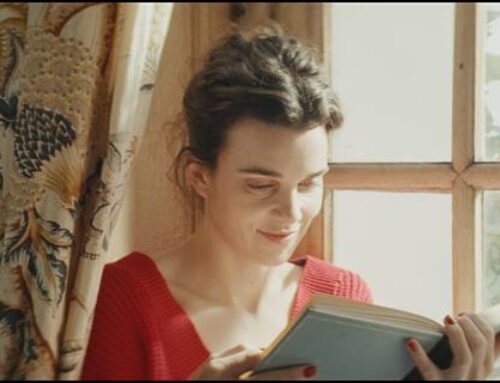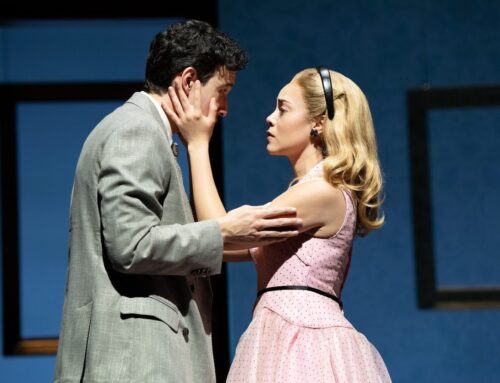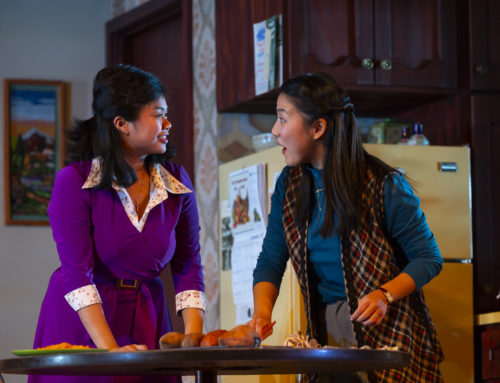A famous critic once said, “The curtain went up at 8 o’clock sharp and came down at 10:30 dull.” The sentiment applies to the only pre-Broadway engagement of TEA AT FIVE now onstage at the Huntington Avenue Theatre.
TEA AT FIVE is a dated, sentimental sliver of a one-woman show about Oscar-winning screen icon Katharine Hepburn starring Oscar-winning screen legend Faye Dunaway. Dunaway has the cheekbones, the height, the carriage, and the presence, but she was not in possession of Hepburn’s voice, character, or lines on opening night. More than that, I wondered why a legend in her own right would want to subordinate herself to another idiosyncratic diva, and shoehorn her striking presence and distinctive talent into the narrow confines of this tired material.
Faye does her best to flesh out this impersonation, but the superficiality of this compilation of anecdotes are more suited to tabloid consumption than a play. In fact, this is playwright Matthew Lombardo’s second iteration of the play, tailored for Dunaway, and which he has trimmed from two acts to one, eliminating the early Hepburn at 31, placing it all within the recollections of the 76 year-old Kate, and chiseling the myth to its broadest facets. We are all short-changed.
When the curtain goes up, we meet Dunaway as Kate sitting center stage (lovely set and lighting) on a couch at Fenwick her Connecticut country house. A tousled bun atop her head, she’s home alone with an injured ankle and a cane (which she promptly tosses!) and holds court with her assembled acolytes, the audience. Miss Hepburn assumes we know and care about her, and the longer I sat there, I wondered how true that was. If you are under 35, you probably don’t know the difference between Audrey or Katharine– probably don’t give a hoot (care), if you know either of them at all.
If you are over 50, you certainly know Katharine Hepburn and most likely the oft-repeated Hepburn lore, and so the evening becomes a dull recapitulation of the well-worn strands of increasingly vestigial stories: the suicide of her beloved brother, those calla lilies, her career ups and downs from Oscar winner to “box office poison,” culminating in the decades-long openly clandestine liaison with “Spence.” It’s bookended by phone calls from “Warren” (as in Beatty–whoever he is) for extra titillation.
That leaves the solo performance. I’ve mentioned Dunaway went up on her lines, but often enough to make me uncomfortable. It also marred some of the comic timing. But more problematic was how flaccid the overall performance. Missing was the Hepburn starch, her crisp way with a line, the snap, crackle, pop of her cadence and the through line to her temperament: Hepburn’s voice.
That highfalutin British/American accent (known as Mid-Atlantic English) which sometimes sounded so phony on the actors of the day, found a home in this Connecticut Yankee’s utterances; nasally and insinuating, that voice oozed breeding and sometimes a faint sneer, but for Hepburn, it always channeled her ramrod confidence in her own convictions. That voice is the direct line to her character, at least the one she showed the world. If Dunaway were to really capture that voice, then when it broke, we would feel the heartbreak.
Dunaway excavates Hepburn’s raw bone frailty only once in the course of 80 minutes, and that was in her telling of the traumatic death of her teenaged brother Tom whose body she discovered. Dunaway dug, I was moved. Later, the story would be cheapened by having Hepburn conflate that memory with another death, that of her beloved “Spence.” In a maudlin scene written by the numbers in an attempt to make it resonate, the latter scene resounded like the clanging of a bell out of tune.
TEA AT FIVE is slated for Broadway, but until then, it will remain onstage at the Huntington Theatre through July 14th clinging to life in the hands of an actress who deserves better, and is better suited to relevant material she can honestly embrace as a substantial performer in her own right. How about a one-woman show about Faye Dunaway starring Faye Dunaway?







Leave A Comment
You must be logged in to post a comment.